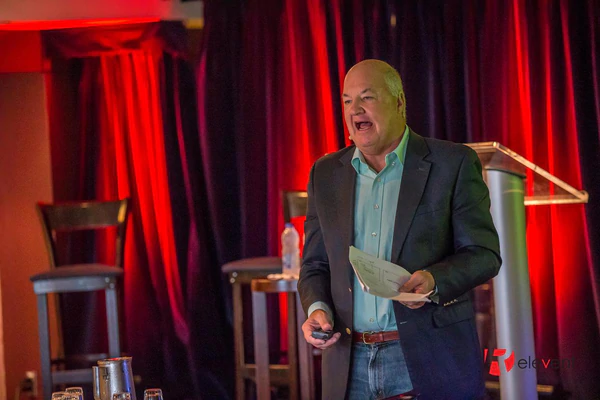How to sell more sponsorships with Rick Jones

By Joey Franco
Rick Jones, the Atlanta native and head of FishBait Marketing, loves to fish—hence the name of his company.
And he loves to cook.
One of his favorite dishes is gumbo, a seafood stew that originated in southern Louisiana during the 18th century. Jones takes his gumbo seriously, and according to the 61 year-old, the most important ingredient in his favoured recipe isn’t edible, or even tangible for that matter. The most crucial element in Jones’s beloved gumbo is time.
“The longer it sits, the better it gets,” he explains.
Jones extends the same thinking to his sponsorship tactic. “We need to have respect towards history. Human beings haven’t changed in 5000 years; we still have the same needs.”
He believes that many challenges can be overcome by looking back. “In the business of marketing, and in the business of sponsorship, new and improved is not necessarily always appropriate,” he says.
It’s no wonder that the sponsorship veteran refers to himself as “The Captain” at FishBait Marketing. Over the course of his outstanding three-decade career, he has sold sponsorship packages for some of the top sports and entertainment properties in the world: Wimbledon, the PGA Tour, the Goodwill Games and the Cricket World Cup—to name a few.
Given his stellar track record, the question begs to be asked: What is his magic formula?
The Captain believes it’s all about wisdom.
“We live in a world where we’ve got more information that we’ve ever had in the history of mankind and it can be accessed from anywhere,” he says. “But we have a shortage of wisdom!”
Granted wisdom comes from trial and error, but it’s only when experience is reflected
upon—analyzed in terms of its effects—that it becomes actionable information. But what about more junior sponsorship professionals who haven’t yet accumulated years of life experience? Jones responds in four words: “Read. Ask. Listen. Apply.”
If there’s something Rick Jones loves more than fishing and cooking, it’s telling stories laced with Southern-twanged down-home analogies. In fact, he’s published an anthology of his favorite quotes: “Analog Advice in a Digital World.”
The idea for the book was spurred by his children, who suggested he capture the many pearls of wisdom (“Dad-isms”—is the affectionate term they’ve coined) that he’s passed on to them throughout the years. The book is a life manual, of sorts, geared to millennials. “They need read only one quote a week, since they have short attention spans,” he winks.
One of the many stories Jones likes to recount is about the age-old custom where an outgoing president of the United States writes a personal letter to his successor and leaves it in the top drawer of the presidential desk. “It’s a passing on of wisdom,” he says. A mere heartbeat after Jones tells this story, he drops another Dad-ism for emphasis: “No matter how smart you think you are, till you’ve actually sat in that chair, you don’t know that.”
And speaking of smart—you better be just that to make it in the sponsorship industry. Jones believes that sponsorship is the most complicated form of marketing because it utilizes all forms of marketing communication: advertising, promotion, public relations, and social media. It is, it would seem, the gumbo of the marketing world.
He cautions that sponsorships live within their own ecosystems, and, like any ecosystem, once off balance, they simply die. One nugget of advice to take away from Captain Jones is to sustain sponsorship ecosystems in a balanced way.
How to achieve that? “Invest time in them,” he says, without turning to any highfalutin method.
Jones offers: “Plan your work, and work your plan. Have daily action items to sell more sponsorships. And just show up, because 80% of success is a result of showing up.”
The formidable marketer also stresses the importance of customization. Yessiree, no cookie-cutter solutions—no matter how good—for Jones. “No one one wants to buy pre-fix anything. Ascertain that you’re selling exactly what a company, brand, or product wants.”
And knowing when to sell is critical according to Jones. “I like to pitch at the end of the week when people tend to be in a better mood and they have the weekend ahead to noodle my ideas to make them their own.”
There you have it. Build on the Captain’s sound advice and the rest should be smooth sailing.
